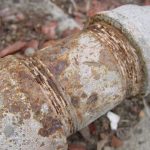Every day, a hidden network of plumbing pipes carries fresh water into around your entire home. It’s easy to forget about these pipes, and to take them for granted because “out of sight is out of mind”. But, when a water leak or drain clog occurs, it can cause a lot of damage in a very short period of time. A sufficient buildup of internal pressure can cause a pipe to burst, and water damage is consistently ranked highly as a source of home insurance claims. For this reason, it makes sense to take steps to protect your home from burst pipes and here are seven common causes to consider.
1. Tree Root Intrusions
There may be extensive root systems growing under your yard, even if you don’t have any trees. Tree roots tend to spread over large distances, and these root systems can cause significant damage to pipes and drain lines. This is especially true if you have compacted soil because the pressure can be even more excessive. Another problem is that tree roots are always searching for sources of water and nutrients. Even a small leak from your drain line can attract interest, the root grows towards and eventually an intrusion occurs.
After a root intrusion, further growth into the pipe follows naturally, the internal pressure increases and the pipe will burst open. To prevent this situation, try to locate any shrubs and trees far away from your under line plumbing pipes and drain lines. If a root intrusion has already occurred, contact your local certified plumber and get them to inspect your pipes with a camera probe. If frequent clogs and breaks are a problem, it may be possible to carry out a trenchless repair to minimize disruption to your home.
2. Clogging Problems
When clogs form inside your pipes, they can cause an increase in pressure that will eventually lead to leaks or a break. A clogged pipe can lead to a backup of waste water into your home, which can cause a lot of water damage. Even a small clog can cause significant damage, if it’s left unattended for a long time. Some minor clogs can be removed with a simple cup plunger, or you may get good results with a plumbing snake (augur). But, you should avoid using chemical drain cleaning products because the caustic chemicals can damage your pipes. A professional plumber will always use a manual removal method to minimize the potential for damage to your pipes.
Adopting a proactive approach also makes sense. You can install drain covers and avoid pouring anything except waste water into your drains. This will help to prevent the formation of drain clogs and regular plumbing checkups can help to keep your system working efficiently.
3. High Water Pressure Issues
High water pressure can feel great when you take a shower, but it can cause water leaks, pipe damage, and a high volume of water. Modern water pipes are designed to withstand water pressure up to a specified level but it can still cause problems. If you’re concerned about high water pressure, it’s easy to measure it with a hose bib gauge. This inexpensive plumbing tool can be found in many hardware stores at a low price of $10. Simply attach the gauge to an external spigot, open the line and check the reading. A normal water pressure should be 50 up to 80 pounds per square inch or PSI. If the water pressure is higher than 80 PSI, contact your local certified plumber. They can install a valve that reduces the water pressure to a more reasonable level that’s safer for your plumbing pipes.
4. Accidental Pipe Damage
Many homes have plumbing pipes in exposed locations, such as utility rooms and basement rooms. They may be used as a convenient location to hang lightweight items but this is a bad idea because the added stress can cause leaks, cracks, and even breaks. Another common problem is disturbances caused by remodeling projects and repairs that disrupt the exposed pipes and cause damage.
5. Aging Pipes, Corrosion and Rust Problems
Modern plumbing pipes are designed for constant exposure to water, but metal is always at risk from corrosion related issues. Gradually, metal pipes will develop rust spots, and weaknesses at the seals and joints and eventually in the wall of the pipe itself. This eats away at the structure, smaller cracks start to appear and ultimately a rupture is pretty much guaranteed. When pipes are discolored or they have warped, this is a good sign that they are becoming corroded. Another indicator is the yellowing or brown colors of water from your faucets caused by extensive rust problems. Contact your local plumber if you have these problems. It may be possible to repipe your existing pipes to reinforce them. Alternatively, it may make more sense to replace the pipes entirely with newer and more robust pipes.
6. Hard Water Issues
Hard water contains an elevated concentration of naturally occurring minerals, including calcium, magnesium, iron, and others. Hard water is safe to drink and use, but it can cause damage to your plumbing system, water using appliances, and create other problems in your home. Hard water minerals create a buildup of scale on the inner surfaces of plumbing pipes that narrow the pipe over time. This will lead to a drop in water pressure and corrosion that will weaken the pipes. The best way to prevent hard water is to install a water softener system that replaces the harmful mineral ions with more benign sodium or potassium ions.
7. Poor Installation Problems
If your plumbing pipes were installed by someone with poor skills, it can lead to bursts and other problems later. Even a single loose connection or bad soldering job can cause a burst pipe. When you need a plumbing pipe installation, maintenance, or a repair, always contact a certified and licensed plumber. They have the training, skills, and experience to get the job done right.
If you have a burst pipe, shut off the water and contact your local certified plumber using the emergency line to minimize the potential damage to your home.





